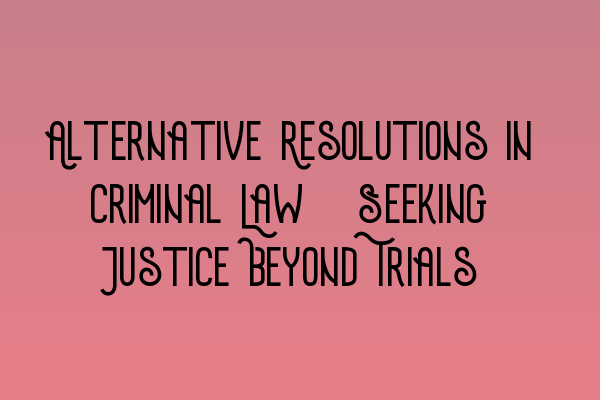Alternative Resolutions in Criminal Law: Seeking Justice Beyond Trials
In the realm of criminal law, trials have long been the traditional method of seeking justice. However, it’s important to recognize that trials are not the only avenue through which justice can be achieved. In fact, alternative resolutions exist that offer benefits to both the accused and the justice system as a whole.
Understanding Alternative Resolutions
Alternative resolutions refer to methods of resolving criminal cases outside of a traditional trial setting. These methods often involve negotiation, mediation, diversion programs, or restorative justice processes. They provide an opportunity for individuals accused of crimes to take responsibility for their actions, repair harm caused to victims, and reintegrate into society without the long and often costly process of a trial.
The Benefits of Alternative Resolutions
1. Efficiency: Alternative resolutions can save time and resources for both the accused and the court system. By avoiding lengthy trials, cases can be resolved more quickly, allowing resources to be allocated to other pressing matters.
2. Rehabilitation: Alternative resolutions focus on addressing the root causes of criminal behavior and providing individuals with opportunities for personal growth and change. Diversion programs, for example, can offer counseling, education, or community service in lieu of traditional punishment.
3. Victim Satisfaction: Alternative resolutions allow victims to have a say in the outcome of the case and actively participate in the resolution process. This can lead to increased satisfaction and closure for victims, as well as the potential for restitution.
4. Reduction in Recidivism: By addressing the underlying issues that contribute to criminal behavior, alternative resolutions have the potential to reduce recidivism rates. By providing support and guidance, individuals can learn from their mistakes and avoid future involvement in criminal activities.
When are Alternative Resolutions Appropriate?
While alternative resolutions offer numerous benefits, they are not suitable for every criminal case. Serious offenses, such as violent crimes or crimes involving vulnerable individuals, may still require a trial to ensure public safety and uphold the principles of justice. However, for lower-level offenses or cases where the accused demonstrates genuine remorse and a commitment to change, alternative resolutions can be an effective method of achieving justice.
It is essential for legal professionals, such as criminal solicitors, to understand the potential for alternative resolutions and be equipped with the knowledge and skills to guide clients through these processes. Continuous professional development, attending workshops and seminars on criminal practice, like those offered by SQE Criminal Law & Practice Law UK, can broaden expertise and enhance the ability to advocate for clients seeking alternative resolutions.
Aspiring solicitors preparing for the SQE Criminal Law exam can also benefit from mastering multiple-choice question (MCQ) strategies. Understanding the complexities of criminal law and exam techniques can significantly improve performance. Consider exploring SQE Criminal Law exam preparation resources, such as the article on Mastering MCQ Strategies for SQE Criminal Law: Conquer the Exam, to enhance your exam preparation.
Staying Informed and Prepared
Keeping up with updates in UK criminal laws is crucial for legal professionals. Being well-informed allows solicitors to provide the best guidance to their clients, ensuring their rights and interests are protected. Explore the article on Updates in UK Criminal Laws: Staying Informed and Prepared to stay up-to-date with the latest developments.
In the context of criminal law, the burden of proof is a fundamental concept. Understanding the legal responsibility placed on the prosecution is essential for a fair trial. If you’re interested in learning more about the burden of proof, check out the article on Burden of Proof in Criminal Law: Unraveling Legal Responsibility.
Conclusion
Alternative resolutions provide a valuable option for achieving justice beyond traditional trials. By considering the circumstances of each case and utilizing alternative resolution processes, legal professionals can help clients find a path towards rehabilitation, restitution, and reintegration into society. Continuous professional development and staying informed about updates in criminal laws ensure solicitors are well-equipped to navigate these alternative paths towards justice.
If you’re preparing for the SQE Criminal Practice exam, consider exploring mock tests and exam simulations to assess your understanding and knowledge. Check out the article on Mock Tests for SQE Criminal Practice: Exam Simulation for Success to discover resources that can help you excel in your exam preparation.
